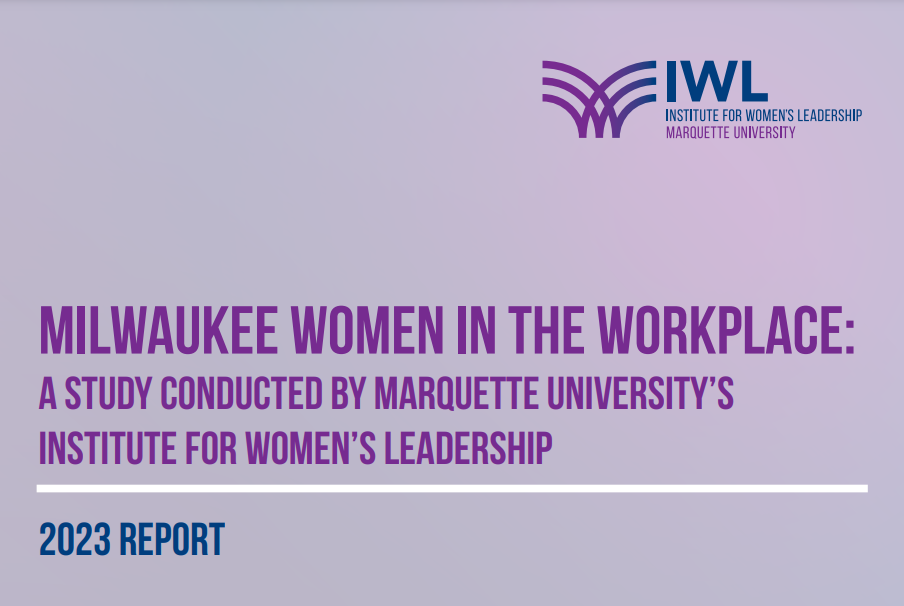
In a survey of nearly 1,600 members of the Milwaukee-area workforce, 48% of women surveyed are currently looking for other career opportunities, citing career advancement, pay and work/life balance as main reasons, according to “Milwaukee Women in the Workplace,” a white paper released by the Institute for Women’s Leadership at Marquette University.
The study sought to understand those factors that encourage women to “engage, inspire and transform” in Milwaukee businesses and the community. A survey was distributed to workers across the Milwaukee area in March; the sample consisted of a broad representation across gender, race/ethnicity, age, industry and rank. Of 1,590 people surveyed, 66% identified as women.
“Diverse and talented women are essential to vibrant communities and thriving economies,” said Dr. Jennica Webster, director of the IWL and the paper’s author. “The findings in this paper identified concerning trends that have led nearly half of the women we surveyed to be looking for a new job in a different organization. While these challenges are pervasive, they are not insurmountable. Business organizations, women’s professional groups, and community leaders all play a role in improving the lives of women in ways that drive the region forward.”
When asked if the respondent was looking for a job in a different organization, 48% of women reported they were, compared to just 35% of men. Across racial and ethnic lines, 55% of Asian women responded in the affirmative with white women, Black women and Latinas reporting 46-49%. The study also found:
- More women, 49%, said they experienced burnout, mental health challenges and difficulty achieving a work/life balance compared to men, 40%. The rates were highest among Black women (55%) and Latinas (54%).
- The lack of opportunities for advancement was reported as the main reason for women to consider leaving their primary employer (21%). Pay (18%) was the second reason and lack of work/life balance (16%) was third.
- For men, work/life balance (23%) was identified as the main reason for considering leaving their employer. Pay (19%) and advancement (16%) were second and third, respectively.
- Those who had a supervisor who included people with diverse opinions and insights in decision-making were 26% less likely to report that they were looking for a new job.
- Those who had a supervisor who made sure everyone in their work group feels like they belong were 37% less likely to report that they were looking for a new job.
- Women in racial/ethnic minority groups were less likely to feel they could be their authentic selves at work. Half of Black women surveyed reported they have felt that they had to present themselves in ways that are different from who they truly are in the workplace. The figure was 48% for Latinas, while under 40% of both white men and women felt that way.
In addition to identifying workplace satisfaction and its factors, the white paper also identified nine recommendations for workplace satisfaction to address women’s workplace concerns, including personal and financial well-being, workplace experiences, retention, workplace people and systems, and community attachment. Notably:
- Prioritize health and well-being
- Support work-life balance
- Be relentless in providing equal pay for equal work and make it transparent
- Fully commit to eliminating non-inclusive workplace behaviors and holding people accountable
- Focus on creating a culture of psychological safety
- Create relationships that provide women
- Develop inclusive leaders, allies and advocates throughout the organization
- Encourage participation in women’s professional organizations
- Promote involvement and social ties in the Milwaukee community
The paper will be the subject of an upcoming virtual TEMPO Talks event on Friday, Nov. 10, at noon. Webster will be joined by Krista Brookman, chair of the IWL board and senior director of diversity and inclusion at Northwestern Mutual, and Jasmine Johnson, IWL board member and vice president of sales for the iHeartMedia Markets Group.
Webster is a professor of management in Marquette’s College of Business Administration. Her research focuses on the types of workplace relationships, climates and processes that impact the experiences, health and well-being of women and traditionally disadvantaged groups. Carsen Murray, graduate assistant with the IWL, contributed to the paper. Sarah Camp, IWL coordinator, served as editor, and Kate Niemer designed the white paper.
The Institute for Women’s Leadership builds upon Marquette University’s historic role as the first coeducational Catholic university in the world beginning in 1909. The mission of the IWL is to support and conduct cutting-edge gender research and build transformational experiences and relationships that empower women and advance women’s leadership.


